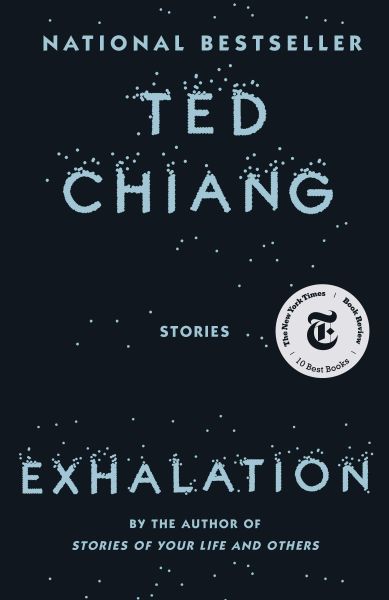Run, Rabbit, Run
Exhalation
By Ted Chiang

24 Jul, 2020
0 comments
Ted Chiang’s 2019 Exhalation is a collection of speculative fiction short works.
The Merchant and the Alchemist’s Gate • (2007) • novelette
A gateway to the past offers riches to some and curses to others. It gives the protagonist a second chance to come to terms with a bitter tragedy.
Common ways to write time travel stories are:
- for the past to be mutable, which Chiang rejects;
- or for the past to be fixed but misunderstood in a way that permits a conventionally happy resolution, which is also not how the final tragedy plays out;
- or for history to be fixed and existence futile, also not where the story heads.
Instead, the protagonist experiences personal growth.
“Exhalation” • (2008) • short story
A mechanical-minded researcher unravels the secrets behind cognition, and in so doing solves a seemingly unrelated mystery concerning clocks. Which brings the unfortunate being face to face with entropy.
Despite the inevitability of extinction, the story is curiously not as downbeat as one might expect. This is a consistent pattern with Chiang (with just a few exceptions).
“What’s Expected of Us” • (2005) • short story
Does free will exist? Would it affect our actions if it did not? Is there another alternative?
The Lifecycle of Software Objects • (2010) • novella
NPCs were written that approached full AI, in an attempt give gamers a better experience. The ethical issues these entities raised were anything but trivial.
Usually, SFnal societies converge on a particular answer to proper ethical behavior toward artificial beings. In this setting, there is no consensus. Gamers come up a variety of answers, from “do whatever we want to beings that are nothing but code” to more compassionate solutions.
“Dacey’s Patent Automatic Nanny” • [Thackery T. Lambshead] • (2011) • short story
Male researchers have engaged in some bold forays into childcare, hoping gain valuable insights into the development of human cognition.
This is a horror story.
The Truth of Fact, the Truth of Feeling • (2013) • novelette
External aids to memory: good, bad, or otherwise? The narrator explores parallel narratives and concludes “yes.”
There are in an odd way parallels between this and his other story, The Merchant and the Alchemist’s Gate, in that reliable records won’t let you change the past, but they do provide an opportunity to better deal with it. Of course, that depends on the person doing the facilitated remembering.
“The Great Silence” • (2015) • short story by Allora and Calzadilla and Ted Chiang
Humans struggle to understand the Great Silence, the apparent absence of nonhuman intelligent life, oblivious to their own role in expanding the Silence.
One of Chiang’s bleaker pieces.
Omphalos • (2019) • novelette
If science points in an unwelcome direction, must religion follow? This story is not about a shocking new revelation; it’s about how people deal with a world that is not as they supposed.
Anxiety Is the Dizziness of Freedom • (2019) • novella
A simple device permits communication with parallel universes branched from the moment the devices are activated. This permits not merely exploration of the ways in which events on the quantum level affect the macroscopic universe, but also provides humans with entirely new ways to ruin their lives.
I couldn’t help but compare and contrast this story to Larry Niven’s “All the Myriad Ways.” Both stories involve existential crises triggered by the existence of parallel universes, but Chiang rejects Niven’s nihilism.
General comments
Chiang is not a prolific author. He takes his time writing award-worthy fiction. In this collection, wins add up as follows:
The Merchant and the Alchemist’s Gate: 2008 Hugo, 2008 Nebula, 2009 Seiun
“Exhalation”: 2008 BSFA, 2009 Hugo, 2009 Locus
The Lifecycle of Software Objects: 2011 Hugo, 2011 Locus, 2012 Seiun
Omphalos: 2020 Locus. Omphalos is also finalist for the 2020 Hugo, and the 2020 Sturgeon,
Anxiety Is the Dizziness of Freedom is a finalist for both the 2020 Hugo, and the Nebula, whose quantum states have not yet collapsed.
Chiang specializes in hard science fiction, taken to its inexorable, logical end. His prose (suitably enough) is efficient and lean. But what makes his works stand out is that — unlike some hard SF authors I could mention — Chiang is not satisfied with writing up mere thought experiments. Each tale features humans (or at least intelligent entities) dealing with the effects of Chiang’s speculations. It’s also notable that he appears to like his protagonists; even when they make suboptimal choices, they are treated with compassion.
Most of his stories can be found in two collections: Exhalation (the collection under review) and Stories of Your Life and Others. If you haven’t read any Ted Chiang, give these books a try. There’s a good chance that you’ll fall under his spell.
Exhalation is available here (Amazon US), here (Amazon Canada), here (Amazon UK), here (Barnes & Noble), here (Book Depository), and here (Chapters-Indigo).
